| BACKGROUND
SCREENING NEWS |
Results
of the 2011 Employers' Background Screening Practices Survey
This year
we continued our approach of sending out a pre-conference post
card to encourage HR Managers attending the SHRM Annual Conference
to complete the survey online and over 33% (more than 140) of
our response were received this way. The attendees at the conference
were very engaging and most rewarding for us it appeared that
attendees were more knowledgeable about background screening
and interested in the survey,
From a results
perspective it was business as usual for the ‘Top Challenges’
with timeliness, cost and accuracy of data once again reigning
as the top three issues of concern.
Most noteworthy
about the question on desired innovations was the increase in
the number of respondents that volunteered an innovation. Also
while ‘integration with HRIS systems’ was the most
frequently mentioned item the clear interest in timely responses
was very evident and the dominant message.
Good news
for the industry was that of the 378 responses to the question
on level of satisfaction 61% were extremely or very satisfied
with their current provider. However, despite this positive
rating from a retention perspective only 32% of clients responded
that they were not planning on changing providers. In other
words 2 out 3 clients were either definitely planning or changing
or were undecided whether to change. This survey is far too
simplistic to decipher the underlying issues associated with
the divergent responses on these two questions, however, even
so, it does point to something that is happening that may be
of concern to the industry.
To see the
full results of the survey and observations click
here.

Many Employees Would Sell Corporate Information, Finds Study
A recent SailPoint Market Pulse survey of more than 3,400 employees
in the United States, Great Britain and Australia, found that
many are willing to disclose classified, sensitive, or proprietary
corporate information after they have resigned or been laid
off. SailPointis a market-leading identity governance solution
company that helps the world's largest organizations to mitigate
risk, reduce IT costs and ensure compliance.
In Great Britain, an alarming 24 percent of employees with access
said they would feel comfortable selling proprietary data for
profit, compared with only 5 and 4 percent for Americans and
Australians, respectively. In fact, British employees yielded
the highest percentages for many of the questions when asked
if they would feel comfortable doing something with the data,
whether it be forwarding electronic files to a non-employee,
or copying files and taking them with them when they left.
"Organizations should be very concerned about the number of
employees that openly admitted to misusing proprietary data,"
said Jackie Gilbert, vice president of marketing and cofounder
at SailPoint.
"These results show that insider threats represent a significant
risk to the business. Some of the biggest and most costly data
breaches have been directly tied to company employees. Having
a written policy is not enough to ensure data security. Organizations
need to have automated controls in place to monitor and manage
user access controls in order to minimize the risk of insider
theft or sabotage."
To read the entire article, click
here

SHRM
Research - Use of Social Networking for Screening
Survey
findings center on social networking websites and online search
engines as a tool for screening potential job candidates. The
data reveal that legal risks, lack of verifiable data and lack
of the job-relatedness of the information gleaned from these
sites can be just some of the reasons why organizations are
avoiding these online resources as a method to screen potential
job candidates.
View slides on this page

Controversy
Abounds In Employment Decisions Based On Social Media Searches
Social
media legal experts and various literature point to a multitude
of issues and risks faced by both the CRA and the employer who
uses social media checks, which include, but are not limited
to:
-
Problems under FCRA section 607(b) in exercising "reasonable
procedures to assure maximum possible accuracy" of the information.
Since the information on social media sites is self-reported
and can be changed at any time, it is often difficult if not
impossible to ascertain that the information is accurate,
authentic and belongs to the subject. Online identity theft
is not uncommon, as are postings under another person's name
for the purpose of "cyber-slamming" (which refers to online
defamation, slander, bullying, harassment, etc.)
- Accessing
the information may be in violation of the federal
Stored Communications
Act (SCA). To the extent that
an employer requests or requires an employee's login or password
information, searches of social networking sites may implicate
the SCA (18 U.S.C. § 2701) and comparable state laws
which prohibit access to stored electronic communications
without valid authorization. A California court recently ruled
that the SCA also may protect an employee's private information
on social networking sites from discovery in civil litigation.
To read
more click
here

Managing
Workplace Drug And Alcohol Testing
Workplace
drug and alcohol testing is used by employers to screen applicants
and test employees for illegal or unauthorized drug and alcohol
use. For many U.S. employers, drug and alcohol testing has become
standard practice, whether or not required by law. An effective
and lawful testing program contains a number of important components
that employers should consider when beginning a program, assessing
a current policy or retooling an existing program to meet changing
needs.
This article
discusses the background of workplace testing; the reasons employers
conduct testing; and the various constitutional, statutory and
regulatory requirements for public and private employers in
certain industries and locations. It provides HR professionals
with the basic framework for administering a program and managing
test results in a nondiscriminatory and legally compliant manner.
It concludes with a discussion of the importance of program
monitoring and assessment of benefits for measuring the return
on investment.
To read
more click
here

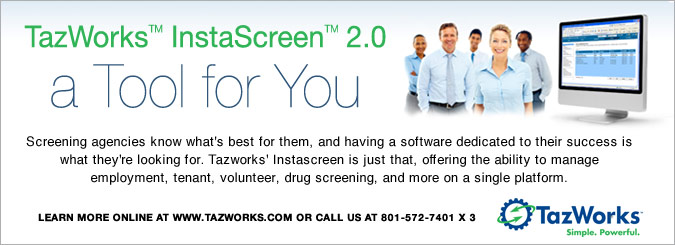

| BACKGROUND
SCREENING NEWS (continued) |
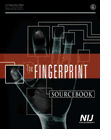 National Institute of Justice Publishes
Fingerprint Sourcebook National Institute of Justice Publishes
Fingerprint Sourcebook
The Department
of Justice's National Institute of Justice (NIJ) today published
The Fingerprint Sourcebook , a comprehensive examination
of the science behind fingerprint identification that will serve
as a definitive resource for experts in the field.
Written by
more than 50 law enforcement and forensic experts worldwide, The
Fingerprint Sourcebook consists of 15 chapters covering:
the anatomy and physiology of friction ridge skin (the uniquely
ridged skin found on the palms and soles); techniques for recording
exemplars from both living and deceased subjects; the FBI's Automated
Fingerprint Identifications Systems (AFIS); latent print development,
preservation and documentation; equipment and laboratory quality
assurance; perceptual, cognitive and psychological factors in
expert identifications; and legal issues.
Individual
chapters of The Fingerprint Sourcebook were previously
published online. This publication is the complete book and will
be available in PDF form.
To read more
click here

Eviction
Related Services Made Easy By Florida Eviction Services
With Florida
Eviction Processing Service Inc.mission is to make eviction related
services easier and more affordable for everybody, from landlords
to property managers! Florida Eviction Processing Service Inc.
is a one-stop eviction service. They prepare paperwork from information
provided, and then follow the eviction through the legal process,
ensuring that the eviction progresses as fast as possible.
They serve
the three-day notice by placing it on the door or handing it to
the tenant, if present, they meet the sheriff at the property,
change the locks and remove the furniture. They provide tenant
screening to help you get a new tenant and avoid a problem tenant.
To read more click
here

Bill
Calls for Background Checks at Utilities
A loophole
in the law does not require workers hired at most power plants
to undergo FBI background checks, even though a federal report
warns the plants are a likely target for terrorists, Senator Charles
Schumer said yesterday in unveiling legislation that would change
that. Schumer cited a recent Department of Homeland Security report
that found disgruntled former employees have sensitive inside
information that would be sought by terrorists. The report also
says current employees have been solicited by unidentified outsiders.
"Power plants
and utilities present a tempting and potentially catastrophic
target to extremists who are bent on wreaking havoc on the United
States, which is why thorough background checks on all workers
with access to the most sensitive areas of these operations are
a must,'' Schumer said. His bill would require FBI background
checks on all employees of major power plants, he said.
To read the full article, click here

| Welcome
to the U.S. Legal Challenge Question! |
Sponsored By:


As
the background screening industry continues to get more competitive
the firms that will ultimately succeed will be those that create
competitive advantage through their people by offering continuous
learning opportunities to heightened their knowledge and capabilities.
We believe that having employees that are very knowledgeable about
the legal landscape of background screening is essential to continued
success.
We
are grateful to Pam Devata, Seyfarth
Shaw LLP for providing the expertise for this valuable endeavor.
For information regarding the answers to the Legal Challenge Questions,
please contact Pamela Devata at Seyfarth Shaw LLP at pdevata@seyfarth.com
or 312-460-5000 or visit www.seyfarth.com.
Please choose
your answer by clicking on it:

| E-VERFIY
AND IMMIGRATION ISSUES |
Latest
I-9 Handbook Reveals New Guidance for Employers
The I-9 form has been updated again by the United States Citizenship
and Immigration Services (USCIS) in their newly revised
version of the I-9 Handbook for Employers also known as "the
M-274" or more commonly known as, "America's most deceptively
complicated one-page form." In June, the USCIS released what was
supposed to be the new version, but had accidently uploaded a
non-updated version instead. The mistake has now been fixed and
it is time for employers to be aware of the latest changes. To
save employers the trouble of scrutinizing all 69 pages of the
handbook, the I-9 and E-Verify Blog has outlined the amendments
employers must know to maintain updated Standard Operating Procedures
(SOPs) and I-9 Training Guides, and to ensure their practices
and policies are abiding by the new rules.
To view the simplified version, click
here

ICE Fines New England Companies Hiring Unlawful Employees
Following
an investigation and audit of Form I-9 documents by U.S. Immigration
and Customs Enforcement's (ICE) Homeland Security Investigations
(HSI), 14 New England employers have been fined this fiscal year
for various violations that enabled companies to hire illegal
aliens. The inspection of the employers' documents are part of
ICE's worksite enforcement strategy, launched in 2009 to reduce
the demand for illegal employment and protect employment opportunities
for the nation's lawful workforce, by focusing its resources on
the auditing and investigation of employers suspected of cultivating
illegal workplaces by hiring workers who are later determined
to be employed illegally.
Nationally,
from fiscal year 2009 to date, ICE has initiated Form I-9 inspections
against nearly 4,000 businesses resulting in fines of nearly $7
million.
"These settlements
serve as a reminder to employers that ICE will continue to hold
them accountable for hiring and maintaining a legal and compliant
workforce," said Bruce M. Foucart, special agent in charge of
ICE HSI in Boston. "We encourage companies to take the employment
verification process seriously."
To read more
click
here

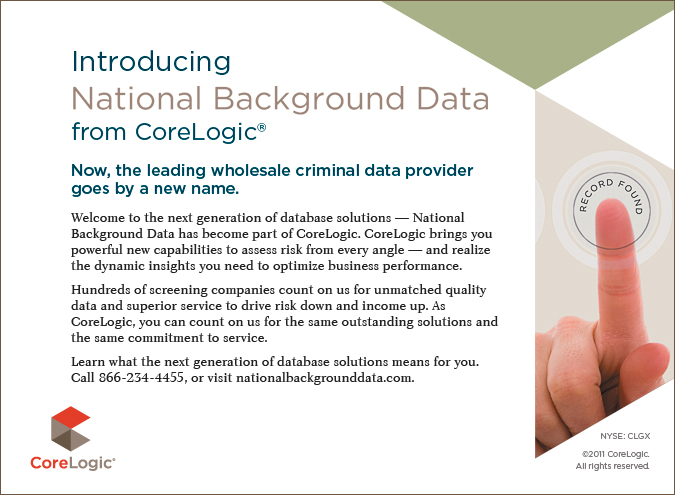

Applicant
Insight Opens Sales and Collaboration Center in Tampa, FL
Applicant Insight, a recognized workforce screening solutions
leader, has established a new, national office in Tampa, Florida.
The state of the art facility will serve as headquarters to the
Applicant Insight Sales Organization and Collaboration & Training
Center, hosting customers, partners and user groups from across
the nation.
"Opening our new sales office and Collaboration & Training
Center was the next logical step in Applicant Insight's growth
path," says Bon Idziak, CEO of Applicant Insight. "Coupled with
our operations center in New Port Richey, FL, the new location
strengthens our commitment by allowing us to share our expertise
and provide personalized support and educational opportunities
to users of our integrated solutions."
To read the
full article, click here

EBI Achieves Cybertrust'sSiteSecure Security Management Recertification
Employment Background Investigations, Inc. has been granted certification
under
the Verizon
CyberTrust Security program for the 9th consecutive year. This
certification reflects EBI's continued compliance with an extensive
and continuous security assurance process, and validates the presence
of risk reduction practices at EBI's headquarters and global operations
center located in Owings Mills, MD. EBI continues its investment
and commitment to consumer confidentiality and strict security
protocols by achieving this certification since 2003. Verizon's
auditors examined the security posture of EBI within the context
of Cybertrust'sSiteSecure Security Management Program. Evaluation
procedures were conducted pursuant to Cybertrust's risk reduction
methodology, which addresses threats across six categories of
risk.
"In today's world of increasing cyber-terrorism and overwhelming
concerns of electronic identity theft, we place the absolute highest
priority on safeguarding the information entrusted to us by our
clients, their applicants and employees," says EBI's President
and CEO, Richard Kurland.
To read more, click here

Innovative
Enterprises Introduces Infinity Screening™ Advanced Post-Hire
Screening Solution
Innovative
Enterprises, Inc., a strategic partner to the background screening
industry and expert provider of court research information products,
smart data solutions and ancillary services, today announced the
official launch of its Infinity Screening™ advanced post-hire
screening solution. Infinity Screening™ leverages Innovative's
industry-leading National Criminal Information Scan™ and
monitors enrolled employees on an ongoing basis, alerting users
to new criminal record information as well as changes to existing
records. Simplified management tools empower users to easily manage
pools of hundreds of thousands of enrolled employees with a few
simple clicks. Using Infinity Screening™, employers can
proactively identify factors which increase their risk to negligent
retention claims, workplace violence, loss due to internal shrinkage
and public embarrassment through negative publicity.
"As recent
events such as the EEOC's July 26th hearing titled,
'Arrest and Conviction Records as a Barrier to Employment' illustrate,
employers may soon bear the burden of making informed hiring decisions
without the benefit of some or all of the information they are
accustomed to relying upon," stated Clifford J. Williams, Innovative's
Vice President and Chief Operating Officer. "At the same time,
employers remain obligated to provide a safe workplace for their
employees and clients, and they have a vested interest in identifying
risks which increase their exposure to liability. The employer
should know if their company driver picked up a DUI charge, if
their child day care worker was arrested for molestation, if their
cashier was indicted for embezzlement or if their in-home service
technician was arrested for assault and battery. Infinity Screening™
resolves these concerns by proactively monitoring employees' public
record information post-hire, alerting the employer to events
which may represent an increased risk in their workplace or a
danger to their employees and customers."
Infinity
Screening™ is not sold directly to employers but is instead
available through Innovative's carefully-selected network of Screening
Industry Partners™.
To find out
more visit http://www.knowthefacts.com

TazWorks
Announces Proprietary Eviction Search
Tazworkshas
launched its highly anticipated InstaEviction National Lookup.
The all new InstaEviction National Lookup combines the power of
Person Search with Trade House Data's National evictions database.
By using the full name and address history associated with the
applicant's SSN, deceptive applicant practices, such as omitting
an address with an eviction, are prevented. This comprehensive
search tool uses sophisticated algorithms to accurately match
the applicant's address and name history essentially eliminating
false positives.
"Through
this unique tool and the depth of data provided by TradeHouse,
eviction history searches are more thorough and accurate than
ever before, allowing our clients to competitively compete against
ANY of the national tenant screening providers with a more cost-effective
product," said Barton Taylor, Founder of Tazworks.
To read the
full article, click
here

Employment
Trends Index Declines
The Conference Board Employment Trends Index™
(ETI) decreased slightly in July
to 100.6, down from June's revised figure of 100.9. The July figure
is up 4 percent from a year ago.
Says Gad Levanon, Associate Director of Macroeconomic Research
at The Conference Board: "The Employment Trends Index declined
in three of the past four months, and is signaling employment
growth of less than 100,000 per month through the end of 2011.
Despite weak employment growth in recent months, GDP has been
growing even slower in the first half of 2011. There is simply
not enough growth in production to warrant stronger hiring."
To read the full report, click
here



SHRM
Leading Indicators of National Employment® (LINE)
SHRM's Leading
Indicators of National Employment (LINE) report tracks trends
in the labor market on a monthly basis, including hiring projections
released one month ahead of the Bureau of Labor Statistics (BLS)
Employment Situation report. Exclusive metrics also include new-hire
compensation trends and recruiting difficulty, as well as job
vacancies in exempt and nonexempt employment.
Source: August
2011 SHRM LINE Report
To read more
click
here

Nipping
Dishonesty in the Bud
A recent
survey conducted by the Institute of Finance and Management (IOFM)
revealed employers are increasingly requiring all prospective
employees to take online personality or integrity tests in hopes
of weeding out dishonest or morally incompetent applicants. With
unemployment rates as high as 18.7
percent in CA alone (Washington Post), employers have the
luxury of hand-selecting their employees to help reduce stealing
and other criminal behavior in the workplace. These pre-screening
tests are already being utilized by 19 percent of the 300 organizations
surveyed by IOFM and they are on the rise.
The survey also found integrity and honesty testing of all employees
is most common among hospitals (37 percent), security firms (32
percent), and entertainment establishments (27 percent).
"This kind
of test, in combination with appropriate information-gathering
about prospective employees, could be a useful predictive tool,"
according to Elizabeth Rowe, a professor at University of Florida
Levin College of Law, in a recent research study on causes of
workplace theft.
To read the
full article, click
here

The
3 Types of Insider Threat
Anyone with privileged access to classified, sensitive, or proprietary
data has the potential to become an "insider threat" to companies.
The idea of insiders has haunted the minds of security professionals
for centuries and, in today's technology-driven society, the opportunities
for insiders to distribute and transfer information outside of
the company have only multiplied. While the motivation for insiders
to steal information has remained fairly constant overtime, (money,
ideology, ego, coercion) Jeffery Jones and Ryan Averback define
and detail three distinct categories of insiders that have emerged:
trusted unwitting insider, trusted witting inside,
and the untrusted insider.
The trusted
unwitting insider threat is typically a person with legitimate
access to a computer system or network, but who unknowingly assists
in transmitting information. The trusted witting insider
on the other hand, has the same type of access but this person
makes a conscious decision to transmit information. Technical
controls stand little chance against the new breed of untrusted
insiders that have developed during the digital age, simply
because network security is good at "stopping the wolf, but differentiating
the wolf from the sheep is an extremely difficult problem to solve."
To learn
more about the three types of insider threats, click
here

23rd Annual Retail Theft Survey
Shoplifters and dishonest employees stole over $7 billion in 2010
from just 23 major retailers, according to the 23 rd
Annual Retail Theft Survey conducted by Jack L. Hayes International,
the leading loss prevention and inventory shrinkage control consulting
firm. The 23 large retail companies surveyed apprehended more
than 1 million shoplifters and dishonest employees in 2010 while
recovering only $148 million from these thieves, down 7.3% from
2009.
"For the first time in over 10 years, total shoplifter and dishonest
employee apprehensions, and the dollars recovered from those apprehensions
all declined from the previous year," said Mark R. Doyle, President
of Jack L. Hayes International. Doyle attributes these declines
to the economy, fewer store employees, and less loss prevention
staffing. "Both shoplifting and employee theft continue to plague
the retail industry, which results in higher prices to the consumer
and can force companies to close unprofitable stores," he added.
For more highlights from this survey click here

STOP
STRUGGLING WITH WRITING AND PUBLISHING YOUR NEWSLETTER: |

We can help
you have a high quality e-newsletter to help nurture your relationship
with your clients and attract new clients. Our customized newsletter
service will take over your newsletter task or create a new one
for you. We can manage the creation of your newsletter for you.
We are constantly
researching information to use for The Background Buzz and
you can put our research to use for you. Using the information
rich content from The Background Buzz (minus the ads
and competitors information) we will create a custom newsletter
for you.
Use your staff’s
time to do more valuable work and save all the hassle of researching
or writing articles, formatting and managing all the other ezine
tasks with our customized ezine process.
Contact Barry
Nixon at 949-770-5264 or at wbnixon@aol.com
for more information.

Public
Record Update
Sponsored by:
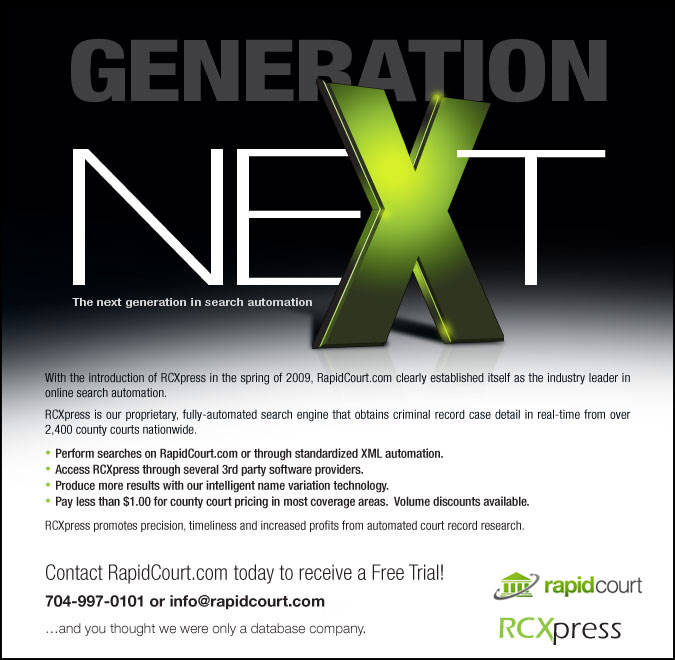

Public
Record Update
By
Mike Sankey, brbpulications, August 2011
| Important
to Illinois Public Record Searchers |
The Illinois
Department of Professional Regulation recently issued a "cease
and desist" letter to a PRRN (Public Record Retriever Network
- www.prrn.us) member based
in Illinois for performing public record research and not having
a private investigator's license. The Department interpreted that
the act of researching public records is considered to be performing
an "investigation." This is regardless if the PRRN Member was
merely researching and reporting to a attorney, private investigator,
or consumer reporting agency (CRA) what is found in a court's
public record docket.
The licensing of Private Investigators is governed by 225 ILCS
§447. Article 5 defines, in part, that a private investigator
is someone who "...engages in the business of, accepts employment
to furnish, or agrees to make or makes investigations for a fee
or other consideration..." Articles 10 and 15 list exemptions.
See the statute at www.ilga.gov/legislation/ilcs/ilcs2.asp?ChapterID=24
To read more
click here



| THE
WASHINGTON REPORT BY MONTSERRAT MILLER |
 Montserrat Miller is a
Partner with the law firm Arnall Golden Gregory, LLP and is based
in Washington, DC. Ms. Miller's practice focuses on privacy and
immigration compliance, as well as representation before Congress
and federal regulatory agencies such as the Federal Trade Commission,
Equal Employment Opportunity Commission, Consumer Financial Protection
Bureau and the Department of Homeland Security. Montserrat Miller is a
Partner with the law firm Arnall Golden Gregory, LLP and is based
in Washington, DC. Ms. Miller's practice focuses on privacy and
immigration compliance, as well as representation before Congress
and federal regulatory agencies such as the Federal Trade Commission,
Equal Employment Opportunity Commission, Consumer Financial Protection
Bureau and the Department of Homeland Security.
You can contact
Monterrat at Montserrat.Miller@AGG.com
or visit http://www.agg.com/Contents/Home.aspx
Consumer
Financial Protection Bureau and Background Screeners
By Montserrat
Miller, Partner, Arnall Golden Gregory LLP
Have you
been wondering whether the Consumer Financial Protection Bureau
(CFPB) is something that you should be paying attention to with
the FCRA being transferred under its auspices from the Federal
Trade Commission?
The most
basic reason is to pay attention is because the Fair Credit Reporting
Act ("FCRA") was "transferred" to the CFPB from the Federal Trade
Commission, and furthermore, because the CFPB has rulemaking and
enforcement powers over consumer reporting agencies ("CRAs").
Unlike certain other industries, the CFPB does not have supervisory
powers over CRAs. This is important because if certain consumer
groups have their way, they would force the CFPB to have supervisory
powers over CRAs. Why is this of concern? Primarily because the
CFPB is tasked with ensuring that consumers have greater transparency
and protections when it comes to financial products and services
and background screening doesn't fit that mold since consumer
reports used for employment and tenant screening aren't a financial
product or service. In fact, Congress agreed and provided employment
and tenant screening companies with an exception under the definition
of "financial products or services" when it comes to the CFPB's
supervisory powers.
However,
several groups, led by the National Employment Law Project (NELP)
and Community Legal Services of Philadelphia (CLS), provided letters
to CFPB essentially trashing the background screening industry
and asking that the CFPB include in its initial rule "the data
and consulting industry that sells employment background checks
among its products". NELP and CLS are aware of the above mentioned
exemption, however, they want CFPB to disregard that exemption
for those companies that may not only provide employment or tenant
screening services, but other services or products as well. They
want companies that may in fact offer "financial products or services",
in addition to employment and tenant screening services, to be
fully covered by the CFPB's supervisory powers. There would be
no distinction between business units and any unit could consume
the whole company.
Click
Here to read more about why the Consumer Financial
Protection Bureau ("CFPB")
should be on your radar screen.

SkillSurvey
Achieves 84-Percent Year-over-Year Bookings Growth for
Q2
SkillSurvey®,
Inc., the inventor and leading-provider of Web 2.0 reference-assessment
solutions, has announced that its bookings for the second
quarter of 2011 increased by 84-percent over the same
period in 2010. "Even during these still uncertain times,
SkillSurvey is experiencing tremendous growth due to the
loyalty of our existing customers, the innovations we
continue to bring to the market, and the fact that our
solution continues to help companies and recruiters improve
their performance and hiring decisions," remarked Ray
Bixler, president and chief executive officer. "SkillSurvey
now has over 500 clients on its roster."
The company also attributes its success to its commitment
to ongoing improvement. "We pride ourselves on never resting
on our laurels," said Bixler. Recently, SkillSurvey enhanced
its Pre-Hire 360® and Passive Candidate Compiler®
by opening its API so they can integrate with applicant
tracking systems and background-screening systems that
hiring companies are already using. Because the systems
can now communicate seamlessly, human resources teams
can enjoy an uninterrupted and coordinated workflow spanning
the entire application-to-onboarding process.
To
read more click
here
|


| REFERENCE
CHECKING (continued) |
A
Negative Job Reference Can Lead To A Claim Of Retaliation
Providing
negative job references could constitute unlawful retaliation
in violation of the Americans With Disabilities Act (ADA), the
Family Medical Leave Act (FMLA) and similar anti-discrimination
laws. In Male
v. Tops Markets, LLC, a federal court in New York
ruled in favor of a former employee, who claimed that the company
provided negative job references in retaliation for her having
filed an earlier discriminationlawsuit. She claimed that in response
to a question from a prospective employer regarding what kind
of employee she had been, and would be, the former employer responded
that she was a good employee the first couple of years, but thereafter
began having personal problems that spilled over into her professional
life, and missed and was late for work because of her personal
and medical issues.
The court
ruled the former employee's allegations were sufficient to support
a claim of unlawful retaliation against her former employer. It
also stated the alleged comment regarding her "medical issues"
created a reasonable inference that the former employer was referring
to her absences which she allegedly took under the FMLA or because
of her alleged disability.Other courts, including the United States
Supreme Court, have previously held that a negative reference
also can support a claim of retaliation under Title VII of the
Civil Rights Act of 1964. The EEOC's
Compliance Manual notes that unlawful retaliation can occur
even after the employment relationship has ended:
To read more
click here



One
Site! Many Suppliers! |
Looking
for the Top Suppliers in the Industry? Need to find a new Supplier?
Visit our VENDOR
SHOWCASEwhich features suppliers to the Background
Screening Industry.
2011
Summer/Fall Edition Directory of Suppliers Coming Soon!


Welcome
to the International Legal Challenge Question
Sponsored by:


Most industries
and firms now compete in a global marketplace which is continuing
to increase the need for background checks for new hires that
will reside in another country or that are being hired from another
country. Commensurate with this growth in background checks is
the need to understand the myriad of data protection, privacy,
human rights and local laws that govern the practice of conducting
background checks. To help background screening firms around the
world to further enhance their knowledge we have launched this
International Legal Challenge.
We are grateful
to Brian Arbetter a Partner with the global law firm of Baker
& McKenzie LLP for providing the question and answer to the
questions in the International Legal Challenge. Brian is based
out of the Firm's Chicago and San Diego offices. His practice
focuses on international law issues, with particular emphasis
on labor and employment, as well as workplace privacy. For information
regarding the answers to the International Legal Challenge questions,
please contact Brian at brian.arbetter@bakermckenzie.com.
Please
Choose One of the Following Answer in Response to the Question
For
information on sponsoring The International Legal Challenge Question
please Click
Here

 Become a Founding Member
of the APAC Chapter of NAPBS Become a Founding Member
of the APAC Chapter of NAPBS
Are you interested
in being recognized as a founding member for the APAC Chapter?
The Chapter is currently accepting Founding Member donations.
As a Founding Member of APAC you will be recognized on the APAC
Chapter website. You can also display the APAC Chapter Founding
Member logo on your company website and printed collateral. The
Founding Member designation does not expire. Your company will
always be recognized as a founding member as long as you are member-in-good-standing
with the association. There is a onetime fee of $500 USD; this
offer will expire on December 31, 2011. Click here
to become a founding member today.
For more
information on the APAC chapter contact Wayne Tollemache at Wayne.Tollemache@fadv.com
Privacy Commissioner Launches Handbook to Help Lawyers Apply Privacy
PIPEDA and Your Practice - A Privacy Handbook for Lawyers was
launched by the Office of the Privacy Commissioner of Canada at
the Canadian Bar Association Canadian Legal Conference and Expo
2011. The new handbook explains how the Personal Information Protection
and Electronic Documents Act (PIPEDA) relates to the everyday
practice of Canadian lawyers in the private sector. PIPEDA covers
the collection, use and disclosure of personal information in
the course of commercial activities. Like other organizations
in Canada, lawyers and law firms must comply with the requirements
of applicable privacy legislation in their jurisdictions.
"While lawyers
may be familiar with privacy laws in general, they may benefit
from some concrete guidance on how to apply the laws to their
own practice," says Patricia Kosseim, General Counsel for the
Office of the Privacy Commissioner of Canada. "Canadian lawyers
have a leadership opportunity to serve as exemplars of ethical
and respectful conduct on behalf of their profession and the clients
they serve."Written by lawyers for lawyers, PIPEDA and Your Practice
- A Privacy Handbook for Lawyers describes best practices in managing
the collection, use and disclosure of personal information, responding
to requests for access to personal information, and the potential
application of PIPEDA. The Handbook covers practical privacy issues
that arise in the course of managing a law firm and conducting
litigation.
To view the handbook, click
here

Court
Okays Random Alcohol Testing
The recent
decision of Irving Pulp & Paper, Limited v. Communications,
Energy and Paperworkers Union of Canada, Local 30, 2011 NBCA
58, by the New Brunswick Court of Appeal has upheld random alcohol
testing where the workplace is determined to be "inherently dangerous"
and the method of testing is minimally intrusive. In this case,
a grievance was brought by a 34-year-old millwright in the maintenance
department of a pulp and paper mill. He was randomly selected
for an immediate breathalyser test. The employer's policy on drug
and alcohol use stated: "Employees involved in safety sensitive
positions will be subjected to unannounced random tests for alcohol."
Although
the employee passed the test, he challenged the policy. His union
alleged there were no reasonable grounds to test because there
had been no accident or incident that would justify such test.
The court ruled that breathalyser testing was minimally intrusive.
The policy only applied to a limited number of employees in legitimately
safety sensitive positions. As a result, the policy was not out
of proportion to the actual and expected benefit. The policy was
justified in the circumstances. This decision is important for
employers. It confirms the employer's right to implement random
alcohol testing for safety sensitive positions in an inherently
dangerous workplace. It must be noted, however, that this ruling
would not necessarily extend to drug testing.
To read more
click here
Obtaining Consent in Europe: Mission Impossible?
The Article 29 Working Party has adopted its opinion
on the definition of consent this past July, clarifying the existing
concept used in the Data Protection Directive and the e-Privacy
Directive.
The opinion breaks down the definition of consent, which is currently
used as the legal basis for processing personal data, into several
conditions necessary for it to be valid. Consent includes "any
indication of wishes…signifying the data subject's agreement,"
but needs to be expressed in a tangible form by way of an oral
or written statement. It also should be freely given, specific,
well informed, unambiguous, and in specific cases, explicit.
In addition, the opinion includes several proposals to be considered
in the review of the Data Protection Directive.
To read the entire article, click
here
Background Checks in Germany
Germany currently contains no specific legislation regarding background
checks. However, statutory constraints do exist pertaining to
the attainment and storage of personal data. Employers must stay
within their rights and limitations outlined by the German Equal
Treatment Act (AGG), the German Data Protection Act, and the personality
rights of each applicant protected under the German Civil Code.
Background checks in Germany rely most heavily on the principle
of direct acquisition of data via the applicant.
Creditworthiness
checks are also prohibited under the German Data Protection Act.
Collecting personal data from the internet is allowed if this
data is accessible to the general public, unless the protectable
interests of the applicant outweigh this. Work-oriented sites
such as LinkedIn are accessible to the public after log-in, whereas
social networking sites like Facebook may not be available due
to privacy settings.
Employers walk a fine line when acquiring information and must
maintain that all enquires are limited to information on the duration
and type of employment. Should employers breach any existing rights,
or conduct any impermissible background checks, applicants can
assert claims for damages
To read more
click
here

Country
Background Screening Essentials
The primary
law governing background checks in Germany is
The Federal Data Protection Act (Bundesdatenschutzgesetz
(BDSG)). As of 1 September 2009 the BDSG provides comprehensive
regulation of the processing of personal data. At the federal
level, this is supported by laws such as the Telecommunications Act of 22 June
2004 . In addition, each German State has privacy legislation
and data privacy commissioners to enforce State laws. On August
25, 2010, the German federal government proposed amendments to
the existing law on the processing of employee data. The draft
law went before the German Parliament for a first reading on November
2010, and is now in effect. This new law now applies to virtually
all data collected and used by employers over the course of an
employment relationship. The new law also restricts background
checks on individuals. A detailed explanation will be covered
under Applicable Statutes.
To read more
click here
Hungary
Adopts New Data Protection Law
On July 24th
The Hungarian Parliament adopted the
Act on Informational Self-Determination and Freedom of Information
(the new Data Protection Act), the domestic implementation
of the European Data Protection Directive (95/46/EC). The new
Act will enter into force by 1 January 2012 and same will replace
the Act LXIII of 1992 on the Protection of Personal Data and Public
Access to Data of Public Interest.
The new Data
Protection Act mainly preserved the material provisions of the
outdated former Law. Similarly to the Data Protection Act currently
in force, the new legislation covers both the general material
provisions of data protection as well as freedom of information.
Since the new Data Protection Act is general law, the legislator
may therefore derogate from its provisions through sectoral legislation.
To read more
click
here
Outsourcers
Exempt from India's Privacy Regulations
The Department
of Information Technology had notified Information Technology
(Reasonable security practices and procedures and sensitive personal
data or information) Rules, 2011 under section 43A of the Information
Technology Act, 2000 on 11.4.2011 vide notification no. G.S.R.
313(E).
These rules are regarding sensitive personal data or information
and are applicable to the body corporate or any person located
within India. Any such body corporate providing services relating
to collection, storage, dealing or handling of sensitive personal
data or information under contractual obligation with any legal
entity located within or outside India is not subject to the requirement
of Rules 5 & 6. Body corporate, providing services to the
provider of information under a contractual obligation directly
with them, as the case may be, however, is subject to Rules 5
& 6. Providers of information, as referred to in these Rules,
are those natural persons who provide sensitive personal data
or information to a body corporate. It is also clarified that
privacy policy, as prescribed in Rule 4, relates to the body corporate
and is not with respect to any particular obligation under any
contract. Further, in Rule 5(1) consent includes consent given
by any mode of electronic communication.
To read more click
here
Skeletons
In The Closet: Can They Come Back To Haunt You?
A question
that often arises when prospective employees apply for available
positions, is exactly how far does the duty to disclose "skeletons
in the closet" go, i.e. does a prospective employee have to disclose
the reason why he left his previous employment and whether disciplinary
action is pending if he is still employed? The Labour Court has
recently dealt with this issue in the matter of the Gauteng Department
of Education ("the GDE") and Mgijima.
The Labour
Court concluded that the position which Mgijima applied for with
the GDE was a senior position and that it required "unimpeachable
honesty and integrity on the part of its incumbent" and further
that Mgijima's failure to disclose material information in response
to an express invitation to do so, deprived the GDE of the opportunity
to make an informed decision as to the effect, if any, of the
suspension and pending charges on the contemplated employment
relationship. This judgment certainly highlights the responsibility
of prospective employees to make full disclosure of any and all
circumstances that may reasonably influence the prospective employment
relationship. It also highlights the employer's recourse should
relevant information not be disclosed. The determination as to
what information is relevant and needs to be disclosed will of
course depend on the specific position applied for, the seniority
of the position and whether disclosure was specifically requested.
To read more
click here
Duty
of Care: Employers Beware
The recent case of Mr Robert McKie v Swindon College [2011] EWHC
469, serves as a warning to employers about the risk of poor communication
regarding former employees. McKie was fired from a newly attained
job at the University of Bath on the basis of an e-mail sent by
his previous employer, Swindon College. The e-mail in question
contained information about McKie that subsequently caused him
to suffer damages and was determined by the Court to have "flouted
elementary standards of fairness, diligence, proper enquiry, natural
justice."
The Court ruled in favor of McKie and held that "an employer owed
a duty to its former employee to take reasonable care when referring
to that former employee in communications with a third party."
This decision expanded the scope of the duty of care on the previously
relied upon precedent case (The House of Lords in Spring v Guardian
Assurance [1994] 2 A.C. 296), to include circumstances beyond
simply providing a reference. This was the first time the Court
acknowledged, "an employer can, outside a reference situation,
owe a former employee a duty of care when communicating with a
third party" and went on to say, "if that former employee suffers
loss as a result of the communication, they may well be entitled
to bring a claim in negligence against their former employer."
To read more
click here

Home
Office Plans For CRB Replacement
The Home
Office has issued a tender for a company to run outsourced disclosure
and barring services. The new service will bring the CRB and ISA
together, and is aimed at supporting the implementation of the
protection of freedoms bill. It will involve the receipt and processing
of referrals for a barring decision, applications for disclosure,
workflow management, customer and registration services, the issuing
of certificates, payment services and running a call centre.
To read more
click here

New
G4S Alcohol and Drug Screening Service Ensures Safety at Work
A new service
from G4S Secure Solutions (UK) aims to help employers in key business
sectors ensure safer working environments, cutting accidents and
improving the bottom line. As research reveals an alcohol-related
productivity loss to the UK economy estimated at £6.4bn and
60% of employers attributing poor performance at work among staff
to alcohol misuse, the Alcohol and Drug Screening service from
G4S, the largest security company in the UK, has been launched
to provide a complete testing solution to business.
The Drug
and Alcohol Screening Service from G4S can be tailored to the
precise requirements of the individual business, offering a closely
managed but discrete process. This can include developing a comprehensive
alcohol and drug policy, carrying out testing, secure on-site
sampling, 'testing for a cause' (for example after a health and
safety incident), and maintaining the secure chain of custody
for any samples through to laboratory testing and delivery of
results.
As part of
its service G4S has certified Alcohol and Drug Screening Officers
who can work confidentially on client premises to provide a seamless
service, including the maintenance of testing records for audit
and compliance purposes.
To read more
click here
| INTERNATIONAL:
PROFESSIONAL WORKSHOPS AND ASSOCATION CONFERENCES
|
(
Click Here to View full list of 2011 International Events
) - Updated Monthly

|
ADVERTISERS IN THIS EDITION |
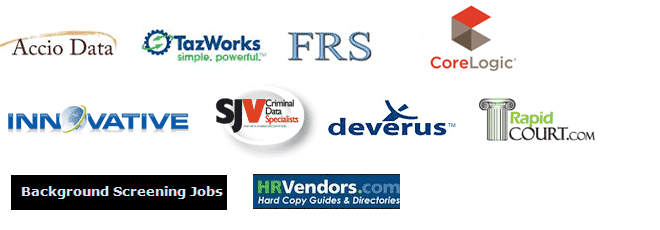

|  |
|
|
| |
|
Background
Screening Jobs |
|
Visit
the Job Board for the Employment and Tenant Screening Industry.
Here you will find resumes of people with industry experience
and employers seeking applicants with experience in Employment
and Tenant Screening and related businesses.
www.backgroundscreeningjobs.com


|
UPCOMING CONFERENCES, COURSES & EVENTS |
2011
Events (
Click Here to View full list of 2011 Events
) - Updated Monthly
SHRM
State Conferences, visit
http://www.shrm.org/Conferences/StateAffilliateConferences/Pages/default.aspx
Drug
and Alcohol Testing Industry Association (DATIA), 2011 Training
Course Schedule, visit
http://datia.org
SAPAA
Training Institute Learning Events, http://www.sapaa.com/
CUPA-HR
Conferences: http://www.cupahr.org/
World
Federation of People Management Associations, Events,
http://www.wfpma.com/events/byregion.asp
|
 Ia
Ora na (yo-rah-nah)!
Ia
Ora na (yo-rah-nah)!



 National Institute of Justice Publishes
Fingerprint Sourcebook
National Institute of Justice Publishes
Fingerprint Sourcebook 




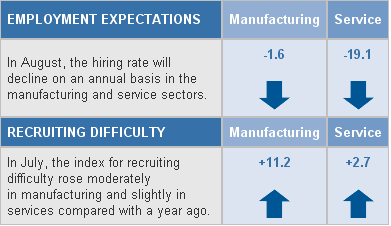



 Montserrat Miller is a
Partner with the law firm Arnall Golden Gregory, LLP and is based
in Washington, DC. Ms. Miller's practice focuses on privacy and
immigration compliance, as well as representation before Congress
and federal regulatory agencies such as the Federal Trade Commission,
Equal Employment Opportunity Commission, Consumer Financial Protection
Bureau and the Department of Homeland Security.
Montserrat Miller is a
Partner with the law firm Arnall Golden Gregory, LLP and is based
in Washington, DC. Ms. Miller's practice focuses on privacy and
immigration compliance, as well as representation before Congress
and federal regulatory agencies such as the Federal Trade Commission,
Equal Employment Opportunity Commission, Consumer Financial Protection
Bureau and the Department of Homeland Security. 




 Become a Founding Member
of the APAC Chapter of NAPBS
Become a Founding Member
of the APAC Chapter of NAPBS 

